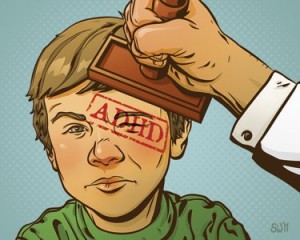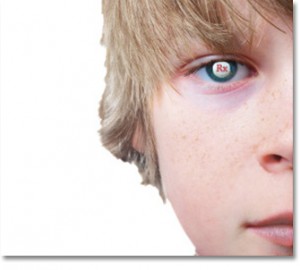By Kelly Patricia O’Meara
October 16, 2014
The pharmaceutical-funded Children and Adults with ADHD (CHADD), one of a “coalition” of sponsors behind “ADHD Awareness Month,” again takes this yearly occasion to disseminate to the masses misleading, unverifiable, and unscientific information about the alleged, yet never proved, “brain disorder,” ADHD, a marketing campaign that does not serve the public interests but fuels pharmaceutical interests. Already, the U.S. consumes more ADHD drugs than the rest of the world combined and shows no signs of abating.
CHADD long has been criticized for putting pharma profits before public interests; having been investigated by the International Narcotics Board and the Drug Enforcement Administration (DEA), with even the U.S. Congress expressing concern over its heavy pharmaceutical funding while operating as a patient’s rights group. For example, in 2009 CHADD received $1.6 million, 36% of its total revenue from pharmaceuticals.
Although there is no science to support any brain abnormality that is ADHD, CHADD’s “ADHD Awareness Month” website persists in continuing the misleading mantra that “Long ago just about every mainstream medical, psychological, and educational organization in the U.S. concluded that ADHD is a real, brain-based medical disorder.”
Watch the video: ADHD? Prove it…”
Sounds good, but is it based in fact? No. Contrary to this pronouncement, there are many within the psychiatric and mental health community who disagree with the ADHD “brain-based medical disorder,” including psychiatrist, Dr. Stefan Kruszewski, who says “virtually anyone at any given time can meet the criteria for bipolar disorder… or ADD [ADHD]. Anyone. And the problem is everyone diagnosed with even one of these illnesses triggers the pill dispenser.”
Harvard-trained psychiatrist, Dr. Peter Breggin, also explains, “there is a great deal of scientific evidence that stimulants cause brain damage with long-term use, yet there is no evidence that these mental illnesses, such as ADHD, exist.”

“There is a great deal of scientific evidence that stimulants cause brain damage with long-term use, yet there is no evidence that these mental illnesses, such as ADHD, exist.” Dr. Peter Breggin, Psychiatrist
And even Allen J. Frances, the former chair of the task force that produced the fourth edition of the American Psychiatric Association’s Diagnostic and Statistical Manual of Mental Disorders (DSM-IV) writes that, “psychiatric diagnosing still relies exclusively on fallible subjective judgments rather than objective biological tests.”
Specifically, Frances explains of ADHD that, “I think we’ve reached the tipping point and feel hopeful that the ADHD fad will soon begin to fade.” And Frances further writes, “misplaced diagnostic exuberance has turned age-appropriate immaturity into a psychiatric disease and treats it with a pill, rather than just letting the kid grow up. The drug companies are delighted.”
Even the nation’s leading drug and mental health agencies cannot support the “brain-based medical disorder.” According to the Centers for Disease Control and Prevention, “scientists are studying cause(s)…” and “there is no single test to diagnose ADHD….” The fact is there is no medical test, let alone a “single” test to diagnose the alleged ADHD.
Additionally, the National Institute of Mental Health (NIMH) is much more direct in its understanding of the cause(s) of ADHD, admitting that, “scientists are not sure what causes ADHD.” Given that the nation’s leading mental health research facility is unable to provide any known science to support that ADHD is a “brain-based medical disorder,” it is not unreasonable to conclude that the information provided by CHADD and the “coalition of sponsors” is simply inaccurate.
 One cannot help but wonder if this yearly regurgitation of inaccurate information about the alleged “brain-based medical disorder,” is contributing to the ever-increasing numbers of children being diagnosed and drugged. The following data are staggering.
One cannot help but wonder if this yearly regurgitation of inaccurate information about the alleged “brain-based medical disorder,” is contributing to the ever-increasing numbers of children being diagnosed and drugged. The following data are staggering.
- 11 percent of children 4-17 years of age (6.4 million) have been diagnosed with ADHD as of 2011.
- The percentage of children with an ADHD diagnosis continues to increase, from 7.8% in 2003 to 9.5% in 2007 and to 11.0% in 2011.
- The average age of ADHD diagnosis was 7 years of age.
- Rates of ADHD diagnosis increased from 3% per year from 1997 to 2006 and an average of 5% per year from 2003 to 2011.
- 188,899 0-5 year olds are taking ADHD drugs.
This breaks down to:
1,422 0-1 year olds
10,413 2-3 year olds
181,023 4-5 year olds
- There are 2,723,126 6-12 year olds and 1,775,896 13-17 year olds on ADHD drugs.

A total of 4,404,360 children in the U.S. between the ages of 0-17, are taking harmful and addictive ADHD drugs for a yet to be scientifically-proven brain abnormality.
A total of 4,404,360 children in the U.S. between the ages of 0-17, are taking harmful and addictive ADHD drugs for a yet to be scientifically-proven brain abnormality.
These startling data are not lost on the Drug Enforcement Administration (DEA), which long has been aware of the serious adverse effects associated with ADHD drug “treatments” and reports “the increased use of this substance (methylphenidate or Ritalin) for the treatment of ADHD has paralleled an increase in its abuse among adolescents and young adults who crush these tablets and snort the powder to get high.”
It also is the DEA that reported, “under similar dosage forms, by the same or similar route of administration, neither animals nor humans can tell the difference between cocaine, amphetamine, methamphetamine or methylphenidate…” and that methylphenidate produces “effects nearly identical to cocaine.”
Moreover, there are 44 warnings from eight countries warning that ADHD drugs/stimulants cause harmful side effects, including heart problems, mania/psychosis, hallucinations, violence, hostility or aggression, seizures, agitation or irritability, anxiety, suicide risk/attempts and death.
That the psychiatric drugs used to “treat” this non-existent “brain-based medical disorder” are harmful to millions of children no longer is up for debate, making it all the more ironic that CHADD uses shamed Harvard psychiatrist Dr. Joseph Biederman as one of its promoters to add credence to the misinformation.
Recall that a 2008 Congressional investigation found that Biederman had failed to report most of at least $1.6 million in consulting fees from pharmaceutical companies, and his research center at Massachusetts General Hospital received $700,000 from Johnson & Johnson in just one year for research on the use of the antipsychotic drug, Risperdal, in children, of which Biederman promised would have a positive outcome prior to conducting the research.
Continued dissemination of misinformation, by those long-proven to have conflicts of interest, about the alleged ADHD does not make it “real” or legitimate. “ADHD Awareness” is about understanding that no scientific or medical information exists that proves that any brain-based abnormality exists that is ADHD. The nation’s families and children deserve the truth, not yearly “Awareness” pharmaceutical-driven propaganda.
–
Kelly Patricia O’Meara is an award-winning former investigative reporter for the Washington Times’ Insight Magazine, penning dozens of articles exposing the fraud of psychiatric diagnosis and the dangers of the psychiatric drugs—including her ground-breaking 1999 cover story, “Guns & Doses,” exposing the link between psychiatric drugs and acts of senseless violence. She is also the author of the highly acclaimed book, Psyched Out: How Psychiatry Sells Mental Illness and Pushes Pills that Kill. Prior to working as an investigative journalist, O’Meara spent sixteen years on Capitol Hill as a congressional staffer to four Members of Congress. She holds a B.S. in Political Science from the University of Maryland.



